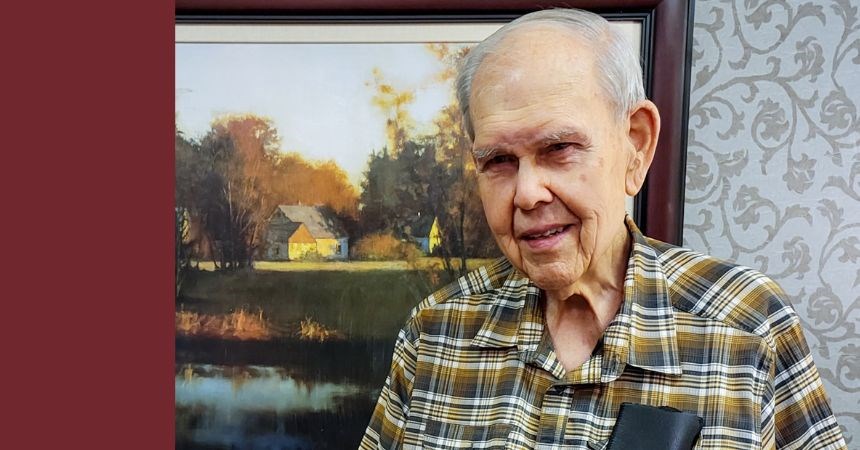At age 89, Armin Rubbert reads math textbooks and proves mathematical theorems for fun. He also laughs easily; and has a quick mind, a heart for troubled children, and a long family history with the Ranch.
Armin spent much of his childhood in Tolley, ND, where his father served as pastor at the German Lutheran Church. While in Tolley, the Rubbert family met Ida and Louis Butt, who took in 10 Ranch boys and eventually donated their farm to Dakota Boys Ranch. Through this connection and his role as a pastor, Armin's father was asked to join the Ranch board of directors, where he served for 30 years.
Armin's love for mathematics started early on. In first grade, he recalls seeing the fourth graders doing multiplication tables. He thought, "I can do that," and started working on them at his desk.
"The teacher came by one day and asked, 'Armin, what's this?' 'Those are my multiplication tables,' I told her. She said I wasn't supposed to be doing them and took my papers. I had a second set hidden at the bottom of my desk. She didn't find those," he said. "And I kept doing multiplication tables."
After graduating from high school, Armin followed his brother to Yankton College where he graduated with majors in Math and Chemistry. He then earned a master's degree in Mathematics at North Dakota State University before moving to Seattle to work at Boeing. While on the west coast, Armin earned a second master's degree in Systems Management from the University of Southern California.
After several positions working for military contractors, he moved to Ohio to work at the Wright Patterson Air Force Base. In 1984, Armin was named Logistics Manager of the Year after finding a way to save $100 million on stocking spare airplane parts, with no change in availability.
In 1994, Armin took early retirement and bought a place on Star Lake, Ottertail County, Minnesota.
"I fixed it up a bit and put some money in it. And then I got married," Armin said, as he pointed to a sign hanging on the wall behind him.
"That sign was given to us at our marriage, and it was about the nicest wedding gift we got," Armin said. "It reads, 'It's never too late to live happily ever after.' We were both 76 when we got married, and for me, it was a first marriage."
Armin and Marie met when he saw an ad for a singles club. "I sent in my name and the information they requested, and they sent me back a list of women my age in a three or four-state area. She was the first woman who called me."
After talking on the telephone and meeting in person, Armin said they figured out they were compatible. So, he took advantage of a perfect opportunity.
"She broke her necklace and spilled the beads all over. I got down to pick up the beads, and said, "As long as I'm down here, will you marry me?"
After their wedding, Armin moved to Cuba City, WI, where Marie had a home.
"We did quite a bit of traveling together," Armin said. "We took bus tours and eventually moved to senior housing in Platteville, WI. We made it a little past our 10th anniversary before she died of heart failure."
Shortly after his wife's death, Armin moved to Fargo, ND to be close to family, including his first-cousin Elizabeth Wick.
This year, after supporting Dakota Boys and Girls Ranch for 32 years, Armin decided to make a larger gift. "I thought about it a while and thought, 'Why wait until I'm dead to give it? Why not enjoy letting them see it.' I called up my sister, Margaret, and she agreed."
"I chose Dakota Boys and Girls Ranch because you're helping teenagers who have emotional problems, helping them be able to go back to live with their parents," Armin said. "That was the goal when my dad was on the board, and I think that's still the goal—to help these kids get control of themselves."
Note from Tammy Noteboom, VP Communications, Dakota Boys and Girls Ranch
When I visited Armin to interview him for this article, I asked my son, Ben, to join me. Ben is a teaching fellow at North Dakota State University, Fargo, ND, where he is finalizing his dissertation for a Ph.D. in Mathematics. I insisted Armin answer my questions before they started talking "math," because I was afraid I'd lose them. I was right.
When I finished asking questions, I said, "I think that's all I need. If you want to talk about math, go for it," and they started speaking a different language.
Armin said, "Math was just a natural for me. I bet for you too. OK, here's one. A couple years ago I was reading a high school algebra book that said the log of minus one doesn't exist. I can prove that it does. It's a complex variable. To prove it, we need to find some new algebraic function."
And the discussion continued as they talked about how they might be able to prove Armin's theorem—cosine of power X, PI, radians, cosine of X is minus one, and on and on. Their banter and shared passion delighted me—even though I was lost at "log of minus one."
As we walked out to the car, Ben said, "I want to be just like Armin when I'm 89. He is so sharp, and I love that he spends his time studying and solving problems."
This article was originally published in Ranch Voice: Spring 2022.
Read more stories like this and explore other issues of Ranch Voice here.

